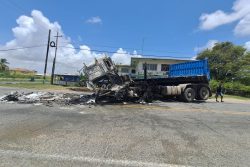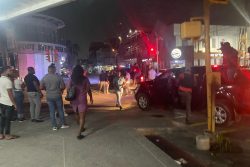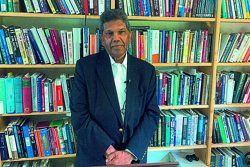In a letter to SN of January 13 Dr. Kwesi Sansculotte-Greenidge pointed out the necessity and possibility of a political solution to Guyana’s ethno-political problems through constitutional restructuring. The proposals, which would find many supporters, flounders on the narratives of victimology by Guyana’s two major ethnic groups, which fuel a relentless drive to seek dominance. It is this, not satanic evil, that is evidenced in the nature of organized political activity in Guyana and is responsible for Guyana’s ethno-political dilemmas.
The African-dominated PNC has held political office for 33 years. Yet some African advocates complain that Africans remain disadvantaged notwithstanding, they claim, the superior, historical, contributions of Africans to Guyana’s development. Some hint that affirmative action, such as accelerated land distribution to Africans, is justified in the circumstances. Others castigate the PPP for marginalizing Africans and hindering their access to Guyana’s wealth, which is controlled by Indians. Indian advocates complain that they were deprived of political power by fraud from 1968 to 1992, suffered intensive discrimination during the PNC’s unlawful hold on power, that their foods were banned, that they have been, even up to now, repeatedly subjected to political violence, that they were excluded from access to educational opportunities and the public service, that the rice industry was decimated and the sugar industry was raided and destroyed by the sugar levy. Events of 2020 will no doubt reinforce some of those views. Sociological and cultural differences run deep.
It is after two decades of “socialism” and national emphasis on the rights of and benefits to workers led by trade unionists, that African access to wealth emerged as another layer to the narrative. It started during the Hoyte government (1985-1992) when some referred to Desmond Hoyte as Desmond “Persaud,” pointing to the support his government gave to Indian businessmen. That narrative intensified during the PPP administrations (1992-2015) to the effect that only Indians are getting opportunities for the accumulation of wealth, especially through government contracts.
Three distinct vocal demands appear to have emerged from African voices – that Africans must have equal access to opportunities for accumulation as Indians, that African working people must have equal access to jobs, housing, education and health, and that discrimination and marginalization must cease. The Indian vocal perspectives appear to be concentrated on the needs of the sugar and rice industries, safety and security, cultural protection and, when APNU is in power, no political and ethnic discrimination.
Our political history since Independence in 1966 has revealed that ethno-political dominance would not create political stability or security but, even so, it would not be discarded voluntarily by either major political party. To abandon the narratives derived from victimology is to abandon the human instinct for security and survival in a sub-optimally functioning polity in which electoral success is rejected as a legitimate, democratic, determinant, but in which no other determinant is acceptable. The recalcitrance generated by notions of illegitimacy derived from historic, cultural and political differences, intensified by fifty years of the struggle for ethno-political dominance, is the reason for the problem’s resistance to solution, notwithstanding the constitutional resolutions in Surinam and Northern Ireland. Trinidad and Tobago has an ethnic composition and cultural and colonial history similar to our own. But its politics evolved differently. Eric Williams remained in power for about two decades with important Indo-Trinidadian allies. There was never a Cold War issue and no inter-ethnic violence. Both major parties today alternate in office due to a large floating vote.
Guyana missed the opportunity for a political solution in 2011. But the grip of the narrative was too strong. It constrained the PPP from seeking a coalition government when it was the only rational thing to do, having been returned with a minority. The constitution allowed the PPP to form the government. But the instinct for dominance was so entrenched that it nurtured a totally unrealistic belief that it could sustain itself in office with the support of the Opposition by goodwill and reasoned discourse. How does one arrive at a conclusion that a minority government can survive, or be potentially returned to office, unless it shares power, or receives support in exchange for giving up something? Where does that happen? Had the PPP formed a coalition with APNU, Donald Ramotar would have now been in the last year of his second term, ruminating over his achievements in a momentous era.
The PPP adopted shared governance in 1978 and promoted it up to 1991. After it won the 1992 elections, PPP triumphalism and PNCR hostility killed it. In about 2001, Hoyte adopted shared governance but by then it was too late. A new President was in office, anxious to make his mark. A ray of hope re-emerged in 2015 when APNU+AFC included detailed proposals for shared governance in its manifesto. After it realized that it may have to play a subordinate role to the PPP after future elections in which it could potentially lose its one seat majority, it abandoned its manifesto promise. Dr. Sansculotte-Greenidge is right about the necessity of constitutional restructuring, but the possibility? It is not about to happen any time soon.










